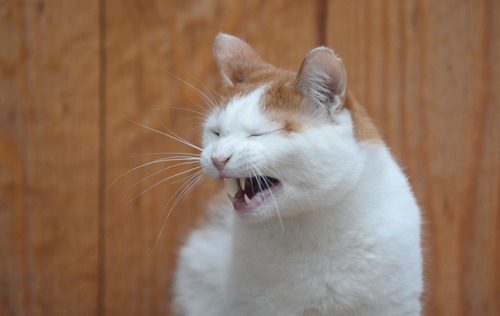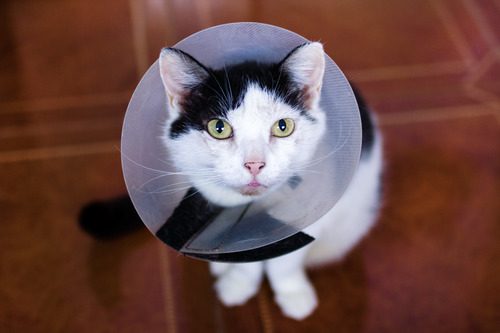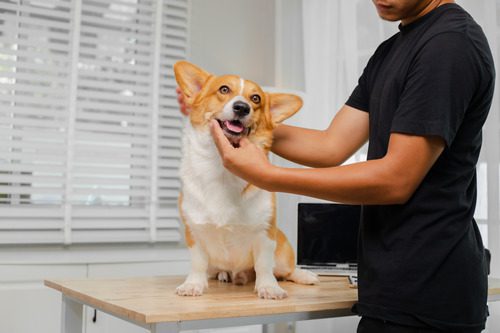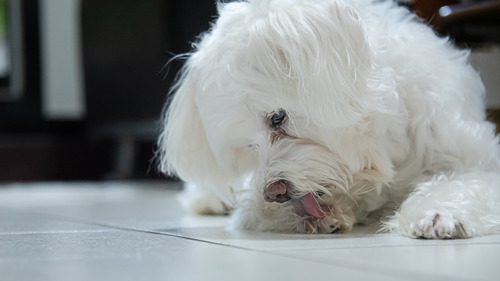Why Is My Cat Reverse Sneezing?
If you’ve ever seen your cat suddenly stop, extend their neck, and make a series of snorting or honking sounds, you may have wondered, “Why is my cat reverse sneezing?” The sight can be surprising, and the sound may make you think your cat is struggling to breathe. Reverse sneezing episodes often pass quickly, but they leave many pet owners feeling concerned. In this blog, we’ll help you better understand what’s happening when a cat reverse sneezes, so you can feel more at ease and recognize when it might be time to reach out to Cornerstone Veterinary Hospital of Saratoga Springs for veterinary care.

What Does Reverse Sneezing Look and Sound Like?
Reverse sneezing is a reflex that involves rapid inhalations through the nose, creating a snorting or honking sound. Unlike a regular sneeze, which is a forceful expulsion of air outward, reverse sneezing pulls air inward. During an episode, cats may:
- Extend their necks forward
- Open their mouths slightly
- Make loud snorting or wheezing sounds
- Appear momentarily tense or startled
Most episodes last only a few seconds and then stop suddenly, leaving the cat looking normal again. While it can sound dramatic, reverse sneezing is generally harmless when it occurs occasionally. Still, many pet owners ask, “Why is my cat reverse sneezing so often?” That’s where knowing the possible triggers becomes helpful.
Why Is My Cat Reverse Sneezing in the First Place?
The question “Why is my cat reverse sneezing?” often comes up because there are multiple potential reasons. Reverse sneezing is usually the body’s way of responding to irritation in the nasal passages, throat, or soft palate.
Common Triggers for Reverse Sneezing
- Environmental Irritants: Dust, pollen, strong scents, or cleaning products can irritate the nasal passages, leading to reverse sneezing episodes. Cats are especially sensitive to changes in air quality.
- Seasonal Allergies: Just like people, cats can experience seasonal allergies. When pollen counts rise, some cats may reverse sneeze more frequently.
- Excitement or Activity: Moments of play or sudden excitement sometimes trigger reverse sneezing. The increased airflow and stimulation can cause the reflex.
- Nasal or Throat Irritation: Irritation caused by minor inflammation, mucus, or even a small foreign particle can prompt reverse sneezing.
- Anatomical Factors: Cats with narrower nasal passages or certain structural features may be more prone to reverse sneezing episodes.
When pet owners ask, “Why is my cat reverse sneezing multiple times in a day?” it’s often linked to one of these factors. While occasional episodes can be normal, frequent or prolonged bouts may warrant a veterinary evaluation.
How Reverse Sneezing Differs from Other Respiratory Issues
Because reverse sneezing looks unusual, many pet owners worry it could be a sign of something more serious. Asking, “Why is my cat reverse sneezing instead of just coughing or sneezing normally?” is a valid concern.
Reverse Sneezing vs. Coughing
Coughing typically involves expelling air outward, often producing a dry hacking sound. Reverse sneezing, on the other hand, pulls air inward with a snorting sound.
Reverse Sneezing vs. Wheezing
Wheezing usually signals a lower airway issue, such as asthma or bronchitis. Reverse sneezing affects the upper airway, specifically the nasal passages and throat.
Reverse Sneezing vs. Regular Sneezing
A normal sneeze clears irritants outward, while reverse sneezing pulls irritants inward before the body clears them. Recognizing the difference helps pet owners better understand why a cat is reverse sneezing instead of showing other respiratory signs.
Should I Be Concerned About Reverse Sneezing?
Most of the time, reverse sneezing is not harmful. Many cats will have an occasional episode and continue on as if nothing happened. However, when pet owners ask, “Why is my cat reverse sneezing more often than usual?”, the frequency may indicate something else is going on.
When to Contact Your Saratoga Springs Veterinarian
Consider reaching out to Cornerstone Veterinary Hospital of Saratoga Springs at (518) 691-3300 if you notice:
- Episodes lasting longer than a minute
- Reverse sneezing happening multiple times per day
- Accompanying symptoms like nasal discharge, coughing, or lethargy
- Difficulty recovering from episodes
While reverse sneezing itself may not be dangerous, underlying causes such as respiratory infections, allergies, or other conditions may require veterinary attention.
How Is Reverse Sneezing Evaluated?
When a concerned pet owner brings their cat in and asks, “Why is my cat reverse sneezing so much?” veterinarians will carefully assess the situation.
Medical History and Observations
Your veterinarian will ask about when the episodes occur, how long they last, and whether other symptoms are present.
Physical Examination
A thorough exam of your cat’s mouth, throat, nose, and chest helps rule out structural or respiratory issues.
Diagnostic Testing
If needed, additional tests such as X-rays, bloodwork, or nasal swabs can provide more insight into the cause. This detailed evaluation allows our veterinary team to identify whether the reverse sneezing is an isolated reflex or part of a larger condition.
Can Reverse Sneezing Be Prevented?
When pet owners wonder, “Why is my cat reverse sneezing?”, it’s also natural to think about prevention. While reverse sneezing isn’t always avoidable, reducing exposure to potential triggers can help limit episodes.
Minimize Environmental Irritants
Avoid strong cleaning products, perfumes, and aerosols that may irritate your cat’s airways.
Monitor Seasonal Changes
During peak allergy seasons, keep windows closed when pollen counts are high and clean surfaces regularly.
Regular Veterinary Visits
Routine wellness exams at Cornerstone Veterinary Hospital of Saratoga Springs allow your veterinarian to detect subtle health changes early. By reducing potential irritants and staying proactive, you may notice fewer reverse sneezing episodes in your cat.
Why Is My Cat Reverse Sneezing More Than Before?
When a cat that rarely sneezed in reverse suddenly begins having frequent episodes, pet owners often ask this important question. The increase can point to changing environmental factors, seasonal allergies, or underlying medical conditions that need attention. This is where scheduling an appointment becomes important. At Cornerstone Veterinary Hospital of Saratoga Springs, our team will carefully evaluate your cat, address your concerns, and provide guidance tailored to your pet’s needs.
Supporting Your Cat’s Health in Saratoga Springs
If you’ve been wondering, “Why is my cat reverse sneezing?” you’re not alone. Many pet owners are caught off guard by this unusual reflex. Occasional reverse sneezing may be nothing to worry about, but frequent or severe episodes should be discussed with your veterinarian. At Cornerstone Veterinary Hospital of Saratoga Springs, we can answer your questions, assess your cat’s health, and help you feel confident in their care. Call (518) 691-3300 today to discuss your cat’s symptoms and get peace of mind.
Recent Posts
Cat Spay Incision Lump
Cat Spay Incision Lump: Is It Normal? When you bring your cat home after a spay procedure,…
Dog Loose Tooth: What to Do
Dog Loose Tooth: What to Do When you notice a dog’s loose tooth, it can be an…
Dog Yeast Infection in Paws
Dog Yeast Infection in Paws If your dog has been licking, chewing, or biting at their paws…
About Us
Originally opened as Animal Care Hospital by Dr. Mark Johnston in 1989, the hospital became Cornerstone Veterinary Hospital in 2015 when it was purchased by Drs. Alan and Lisa Knott. The name 'Cornerstone' holds a special place in their hearts, representing not only their Christian faith but also their commitment to being the cornerstone of the community in which they practice. As a family-owned and operated practice, every pet is treated as part of the family, ensuring they receive the highest standard of care. The team at Cornerstone Veterinary Hospital is dedicated to building lasting relationships with clients and their beloved pets, striving to be the cornerstone of the community in which they practice.



